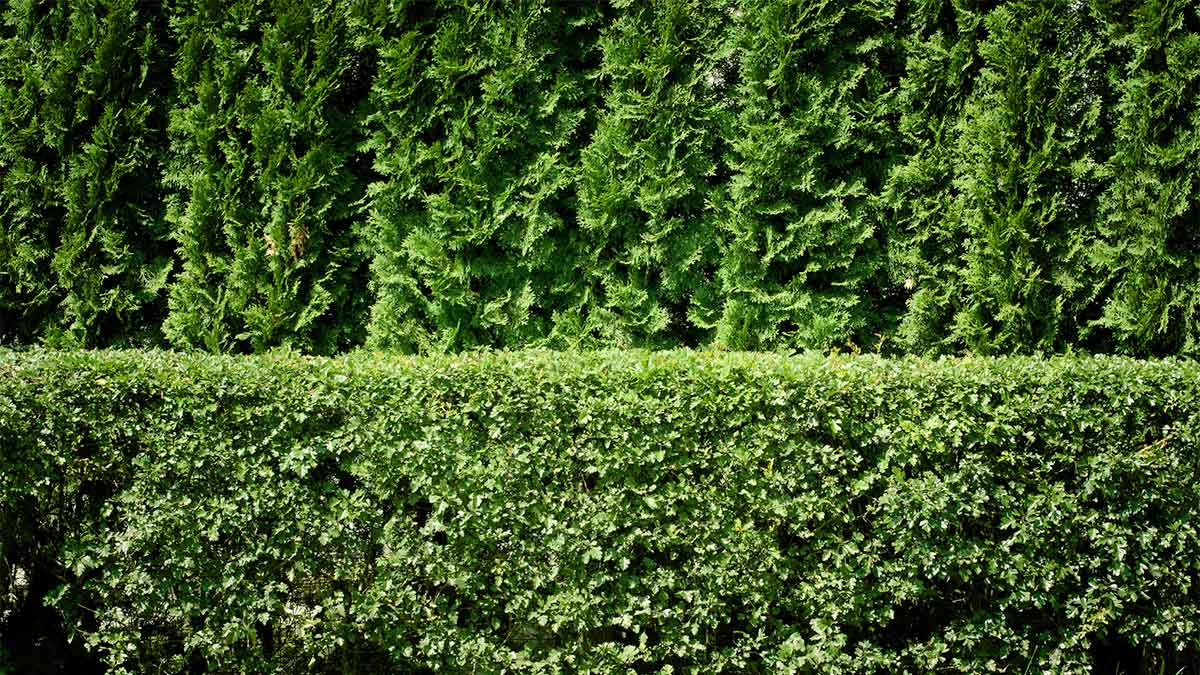Looking to create more privacy in your outdoor space? Evergreen hedges and fences can provide an effective solution. Whether you’re looking to enhance privacy, ensure security, or add decorative elements to your property, this article aims to guide you through the different aspects of creating privacy using fences and hedges. From exploring the characteristics and advantages of various fence types to discussing the importance of choosing the appropriate size and shape, you’ll gain valuable knowledge to make informed decisions when selecting and installing fences. By covering a wide range of topics related to fence types, sizes, shapes, materials, and their suitability for various purposes, this blog will become your go-to resource for all things fences. Plus, we’ll also address some commonly asked questions to provide further clarity and insights.
Types of Fences
When it comes to selecting a fence for your property, there are several options to choose from. Each type of fence offers its own unique benefits and considerations. Here are some of the most common types of fences:
1. Wooden Fences
Wooden fences are a popular choice for their natural beauty and timeless appeal. They can be customized to suit different styles and are available in various designs, such as picket fences, privacy fences, and split rail fences. Wooden fences can enhance the aesthetic appeal of your property and provide a sense of privacy.
2. Chain-Link Fences
Chain-link fences are known for their durability and affordability. They are made from galvanized steel wires woven together to create a sturdy fence structure. Chain-link fences are commonly used for securing property boundaries and are available in different heights. They offer visibility while still providing a level of security.
3. Vinyl Fences
Vinyl fences have gained popularity due to their low maintenance requirements and versatility. They are made from synthetic materials that are resistant to warping, rotting, and fading. Vinyl fences come in various colors and styles, including picket fences and privacy fences. They are an excellent choice for homeowners who want a fence that requires minimal upkeep.
4. Metal Fences
Metal fences, such as aluminum and wrought iron fences, are known for their strength and durability. They can withstand harsh weather conditions and offer a high level of security. Metal fences are available in different designs and can be customized to match the architectural style of your property. They require regular maintenance to prevent rusting.
…
Advantages and Considerations of Different Fence Types
When deciding on the type of fence to install, it’s essential to consider the advantages and maintenance requirements of each option. Here are some key factors to keep in mind:
1. Durability
The durability of a fence is an important consideration, as it determines the lifespan of the fence and the level of maintenance required. Wooden fences, for example, may require regular staining or sealing to protect them from moisture and pests. Metal and vinyl fences, on the other hand, are more resistant to rotting and warping.
2. Maintenance Requirements
Different fence types have varying maintenance requirements. Wooden fences may require regular staining or sealing, as mentioned earlier, to prevent rotting and ensure longevity. Metal fences may require periodic inspections for signs of rust or damage. Vinyl fences, however, are virtually maintenance-free and only require occasional cleaning.
3. Aesthetic Appeal
The aesthetic appeal of a fence can significantly impact the overall look of your property. Wooden fences offer a natural and rustic charm, while chain-link fences provide a more industrial look. Vinyl fences come in various colors and styles, allowing for customization to match your desired aesthetic. Metal fences can add an elegant and timeless appeal to any property.
…
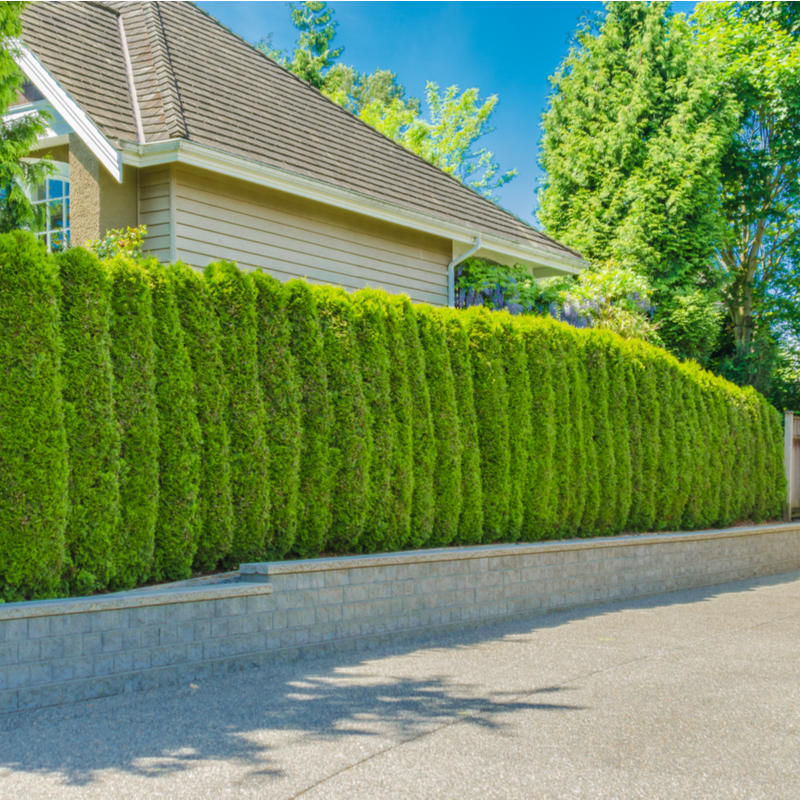
Determining Fence Type for Specific Needs
The type of fence you choose should align with your specific needs and objectives. Here are some common reasons for installing a fence and the suitable fence types for each purpose:
1. Enhancing Privacy
If privacy is your main concern, a wooden fence or a vinyl privacy fence is an excellent choice. These fences offer solid barriers that block the view from outside. Evergreen hedges can also be combined with fences to create a natural privacy screen.
2. Ensuring Security
For security purposes, a metal fence, such as an aluminum or wrought iron fence, is highly recommended. These fences are strong and difficult to climb, providing a deterrent for potential intruders. Chain-link fences can also be enhanced by adding privacy slats or barbed wire.
3. Enclosing a Backyard
To enclose your backyard and keep pets or children safely contained, a chain-link fence or a vinyl fence is a suitable option. Chain-link fences offer visibility, while vinyl fences provide a solid barrier.
4. Adding Decorative Elements
If you’re looking to add decorative elements to your property, a wooden fence or a metal fence can fulfill your needs. Wooden fences can be customized with different designs and paint colors. Metal fences, such as ornamental iron fences, can provide an elegant and decorative touch to your property.
…
Choosing the Appropriate Size and Shape of a Fence
The size and shape of a fence are crucial considerations to ensure that it meets your specific requirements and complements your property. Here are some factors to consider:
1. Considering Property Size
The size of your property will determine the length and height of the fence. Measure the perimeter of your property accurately to determine how much fencing material will be needed.
2. Desired Level of Enclosure
Consider the level of enclosure you desire. If you want complete privacy, opt for a taller fence. If you prefer visibility, a shorter fence or a chain-link fence might be a better choice.
3. Architectural Considerations
The architectural style of your property should influence the design and materials used for your fence. Choose a fence that complements the existing architectural elements to ensure a cohesive look.
…
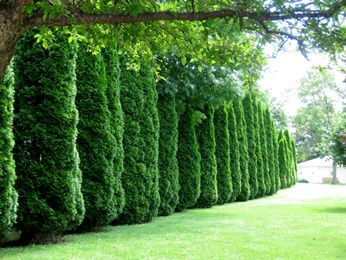
Wooden Fences
Wooden fences have long been a popular choice for homeowners due to their classic and timeless appeal. Here are some benefits of wooden fences:
Benefits of Wooden Fences
-
Natural Beauty: Wooden fences offer a warm and traditional aesthetic that can enhance the overall look of your property.
-
Customization Options: Wooden fences can be customized to suit your preferences, with various designs and paint colors available.
-
Privacy: Wooden fences can provide a solid barrier, offering privacy and seclusion from the outside world.
-
Versatility: Wooden fences can be used for both decorative and functional purposes, such as enclosing a backyard or creating a boundary.
Types of Wood Used
Different types of wood can be used for constructing wooden fences, each with its own characteristics and durability. Common types of wood used include cedar, redwood, pine, and spruce.
Maintenance Tips
To maintain the lifespan and appearance of your wooden fence, regular maintenance is necessary. Here are some essential maintenance tips:
-
Staining or Sealing: Apply a coat of stain or sealant every few years to protect the wood from moisture, decay, and insect damage.
-
Cleaning: Regularly clean the fence panels with soapy water and a soft brush to remove dirt, debris, and mildew.
-
Inspection: Periodically inspect the fence for signs of rot, loose nails, or any damage. Make necessary repairs promptly to prevent further deterioration.
…
Chain-Link Fences
Chain-link fences are known for their durability and affordability. Here are some advantages of choosing a chain-link fence:
Advantages of Chain-Link Fences
-
Durability: Chain-link fences are made from galvanized steel wires, making them resistant to corrosion and weathering.
-
Affordability: Chain-link fences are often the most cost-effective option for securing property boundaries.
-
Visibility: Chain-link fences provide visibility, allowing you to monitor activities outside your property.
-
Low Maintenance: Chain-link fences require minimal maintenance, usually limited to occasional cleaning.
Choosing the Right Gauge
The gauge of a chain-link fence refers to the thickness of the steel wires used in its construction. The higher the gauge number, the thinner the wire. Consider the level of security required when selecting the appropriate gauge for your chain-link fence.
Enhancing Security
While chain-link fences provide a level of security, there are additional features you can add to enhance its effectiveness. Privacy slats or barbed wire can be installed to increase privacy and deter unauthorized access.
…
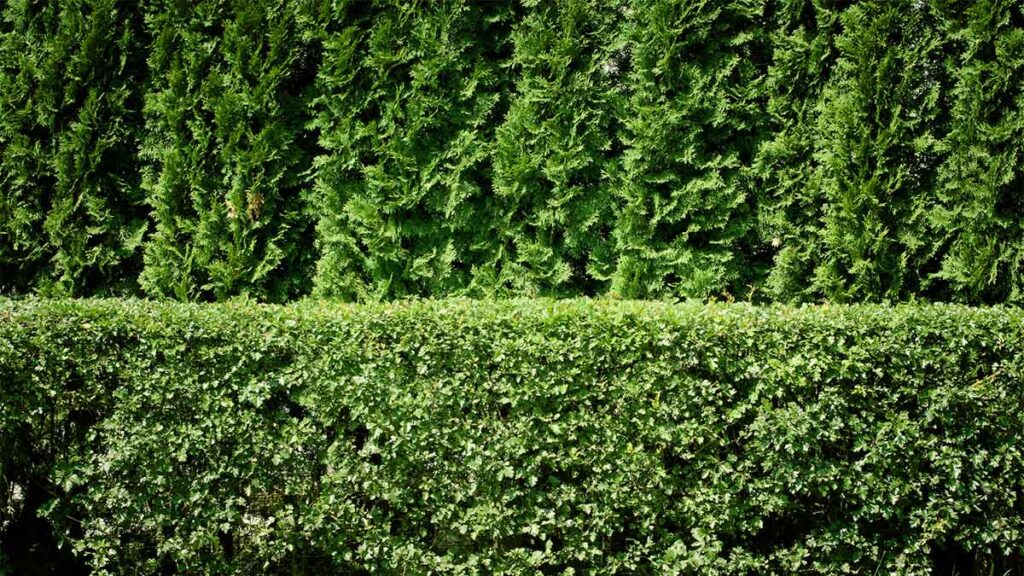
Vinyl Fences
Vinyl fences have gained popularity for their low maintenance requirements and versatility. Here are some advantages of choosing a vinyl fence:
Low Maintenance Vinyl Fences
-
Resistant to Weathering: Vinyl fences are designed to withstand harsh weather conditions, such as extreme heat, cold, and UV rays, without fading or warping.
-
Easy to Clean: Vinyl fences can be cleaned with simple soap and water, eliminating the need for specialized cleaning solutions.
-
Longevity: Vinyl fences are known for their durability and long lifespan, making them a worthwhile investment.
Color and Style Options
Vinyl fences come in a wide range of colors and styles, allowing you to choose one that complements the aesthetic of your property. Whether you prefer a classic white picket fence or a more modern design, vinyl fences offer versatility.
Resisting Weathering and Fading
Unlike other fence materials, vinyl fences are resistant to weathering and fading. The vinyl material is formulated with UV inhibitors to prevent color fading and maintain its original appearance for years to come.
…
Metal Fences
Metal fences, such as aluminum and wrought iron fences, are known for their strength and durability. Here are some benefits of choosing a metal fence:
Strength and Durability of Metal Fences
-
Security: Metal fences provide a high level of security, acting as a deterrent for potential intruders.
-
Long Lifespan: Metal fences are resistant to rotting, warping, and pest damage, resulting in a longer lifespan compared to other fence types.
-
Low Maintenance: Metal fences generally require minimal maintenance, with occasional inspections for signs of rust or damage.
Different Metal Options
There are various metal options available for fences, with aluminum and wrought iron being the most common choices. Aluminum fences are lightweight, rust-resistant, and often come in decorative designs. Wrought iron fences are heavier and offer a more ornamental and classic look.
Enhancing Curb Appeal
Metal fences can enhance the curb appeal of your property, giving it an elegant and timeless look. They can be customized with decorative elements, such as finials or ornamental patterns, to match the architectural style of your home.
…
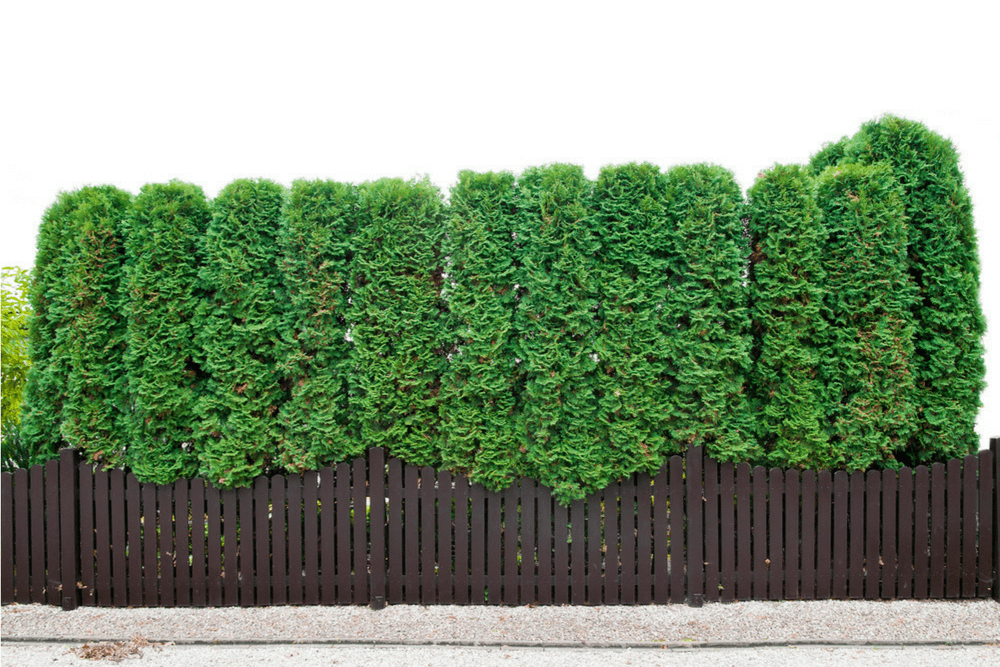
Benefits of Evergreen Hedges
Evergreen hedges can be a great alternative to fences when it comes to creating privacy and adding greenery to your property. Here are some benefits of incorporating evergreen hedges:
Natural Privacy and Sound Barrier
Evergreen hedges provide a natural and dense barrier that can block views from the outside and reduce noise pollution. They create a tranquil and private space within your property.
Year-Round Greenery
Unlike fences that may lose their appeal during the winter months, evergreen hedges maintain their green foliage all year round. This ensures a visually pleasing and vibrant landscape throughout the seasons.
Low Maintenance Requirements
Evergreen hedges typically require less maintenance compared to fences. Regular trimming and pruning are necessary to maintain their desired shape and height. However, they do not require staining, painting, or repairs like fences do.
…
Choosing Suitable Evergreen Hedges
Selecting the right type of evergreen plants for your hedges is crucial to ensure they thrive and meet your specific needs. Here are some factors to consider:
Types of Evergreen Plants
There is a wide variety of evergreen plants to choose from for your hedges. Some popular options include Boxwood, Arborvitae, Leyland Cypress, and Privet. Research each type to determine their growth habits, maintenance requirements, and suitability for your climate.
Growth Rate and Height Considerations
Consider the growth rate and maximum height of the evergreen plants when selecting them for your hedges. You want to ensure that they are suitable for your desired level of privacy and don’t outgrow the space you have available.
Spacing for Optimal Privacy
Proper spacing between the evergreen plants is essential to achieve optimal privacy. Research the recommended spacing for each type of plant to ensure the hedges grow together and create a solid barrier.
…
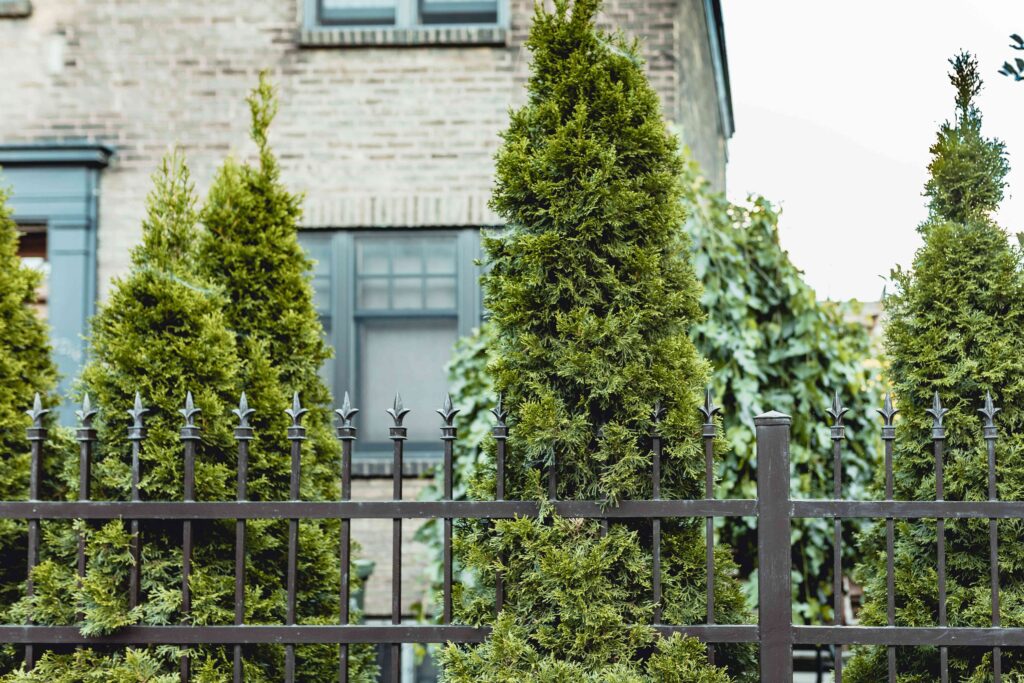
Benefits of Fences for Privacy
Fences can offer excellent privacy solutions for your property. Here are some benefits of using fences to enhance privacy:
Complete Privacy and Noise Reduction
Fences provide a solid barrier that can block the view inside and outside your property, offering complete privacy. They can also act as a noise barrier, reducing the sounds from the surrounding area.
Easy Customization and Design Options
Fences come in various styles, materials, and designs, allowing you to customize them to suit your preferences and complement the aesthetic of your property. Whether you prefer a modern or traditional look, there is a fence design for everyone.
Increased Property Value
Installing a fence not only enhances the privacy of your property but can also increase its value. Fences are considered desirable features for potential buyers, making your property more attractive in the real estate market.
…
Factors to Consider When Installing Privacy Fences
Before installing privacy fences, there are several factors to consider to ensure you make the right choices. Here are some key considerations:
Local Regulations and Permits
Check with your local authorities regarding any specific regulations or permits required for installing a privacy fence. Some municipalities may have height restrictions or setback requirements that you need to adhere to.
Maintenance and Longevity
Consider the maintenance requirements of the privacy fence material you choose. Wooden fences may require regular staining, sealing, or painting, while vinyl fences require minimal upkeep. Additionally, research the expected lifespan of the chosen fence material to assess its long-term value.
Cost and Budget Considerations
Determine your budget for the privacy fence installation, considering the material, labor costs, and any additional features or customization you desire. Compare quotes from different contractors and evaluate the overall cost-effectiveness of each option.
…
Enhancing Privacy with Combining Evergreen Hedges and Fences
If you want to maximize privacy on your property, combining evergreen hedges with fences can be a winning solution. Here’s how you can enhance privacy with this combination:
Creating Double Barriers
By planting evergreen hedges a few feet away from the fence, you create an additional layer of privacy and visual obstruction. This makes it even more challenging for someone to see through or climb over the fence.
Blending Natural and Man-Made Elements
The combination of evergreen hedges and fences creates an appealing contrast between natural and man-made elements. The greenery of the hedges softens the look of the solid fence, creating a more harmonious and inviting aesthetic.
Choosing Complementary Colors and Textures
Consider selecting fence materials and evergreen plants that complement each other in terms of colors and textures. This will create a visually pleasing and cohesive look for your privacy solution.
…
Common Questions about Evergreen Hedges and Fences
- What are the best types of evergreen plants for privacy hedges?
- Some popular types of evergreen plants for privacy hedges include Arborvitae, Leyland Cypress, and Privet.
- How do I determine the right height for my privacy fence?
- The right height for your privacy fence depends on your desired level of privacy. Consider local regulations and local climate factors, as well as the height of neighboring properties.
- How often should I water and fertilize my evergreen hedge?
- The watering and fertilization requirements of evergreen hedges vary depending on the specific type of plant. It’s important to research the recommended watering schedules and fertilizer application guidelines for your chosen evergreen plants.
…
In this table format below is a comparison of the different fence types:
| Fence Type | Durability | Maintenance Requirements | Aesthetic Appeal |
|---|---|---|---|
| Wooden Fences | Moderate | Regular staining/sealing | Natural and warm |
| Chain-Link Fences | High | Minimal | Industrial |
| Vinyl Fences | High | Limited cleaning | Versatile |
| Metal Fences | High | Periodic inspection | Elegant |
| Evergreen Hedges | Moderate | Regular trimming/pruning | Natural and green |
